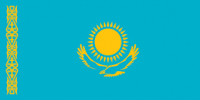Kazakhstan: Aktobe Violence
Rédigé par admin - - aucun commentaire
It took almost a full day after the spate of deadly shootouts broke out in the western oil city of Aktobe for either Prime Minister Karim Masimov or President Nursultan Nazarbayev to make a public statement about the events.
“The head of the state is maintaining this issue under his control,” Masimov told a June 6 Cabinet meeting in perfunctory remarks on the violence.
Security officials have hastily described the violence in Aktobe as the handiwork of religious extremists — code for militant Islamists — but such is the extent of the information blackout that definitively establishing motives is difficult.
Authorities have served as the only source for almost all the details about events in Aktobe on June 5. The first incident occurred at 2:28 pm, when, according to an official account, a large group of people stormed a hunting supplies shop, killing a sales clerk and a security guard, and making away with 17 weapons. Some from that group of attackers stole a police patrol car and went to another hunting supplies shop. Others commandeered a bus, which they used to ram the gates of a National Guard base, where they engaged in a firefight with servicemen, three of whom were killed. Authorities declared a state of emergency, and the city was placed under curfew.
The Interior Ministry said there was yet another attack, on June 6, on a security checkpoint near Aktobe. Three attackers were admitted to a hospital with wounds sustained in that clash — one of them died.
The death toll reached 18 by late June 6: 12 gunmen, three servicemen and three civilians. Interior Minister Kalmukhanbet Kasymov said around six to seven gunmen were at-large.
Local media’s patchy coverage of the unfolding drama meant that many Kazakhstani citizens were able to glean information only from Russian television.
The Aktobe events occurred at a time when the government was focused on containing a volatile source of socio-economic discontent – land protests.
“For the longest time they denied the very possibility of terrorist acts taking place in the country, which they promoted to the world as an ‘island of stability,’” political analyst Dosym Satpayev wrote in a snap commentary on his Facebook account.
Terrorism jumped to the top of the agenda in 2011, when Kazakhstan succumbed to a string of attacks seemingly inspired by radical Islam, many of them in the west of the country. The attacks, many of them botched, left scores dead — mostly suspects and members of the security forces that they were targeting — and culminated in a deadly rampage by a gunman in the southern city of Taraz. Even then, government officials initially attempted to downplay talk of the threat of terrorism and instead attributed the incidents to organized crime before recognizing the rising radical threat.
Copyright © eurasianet
